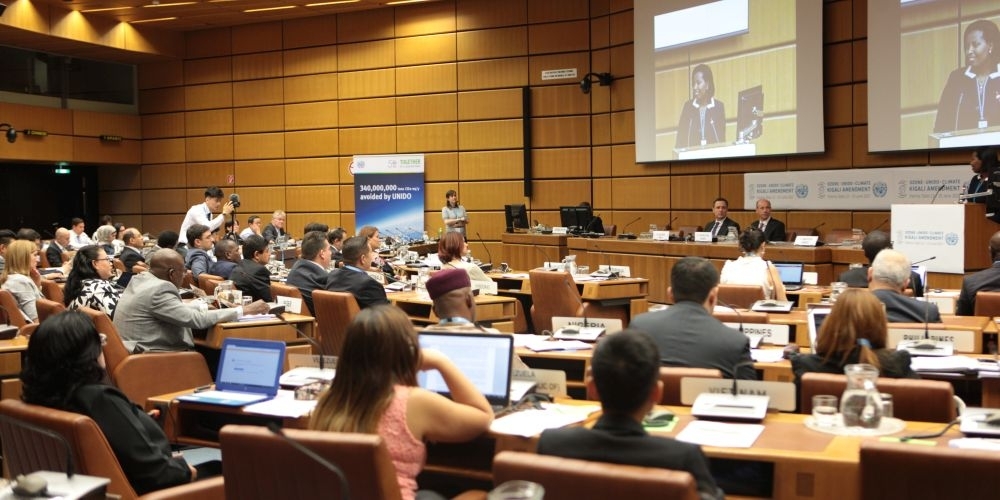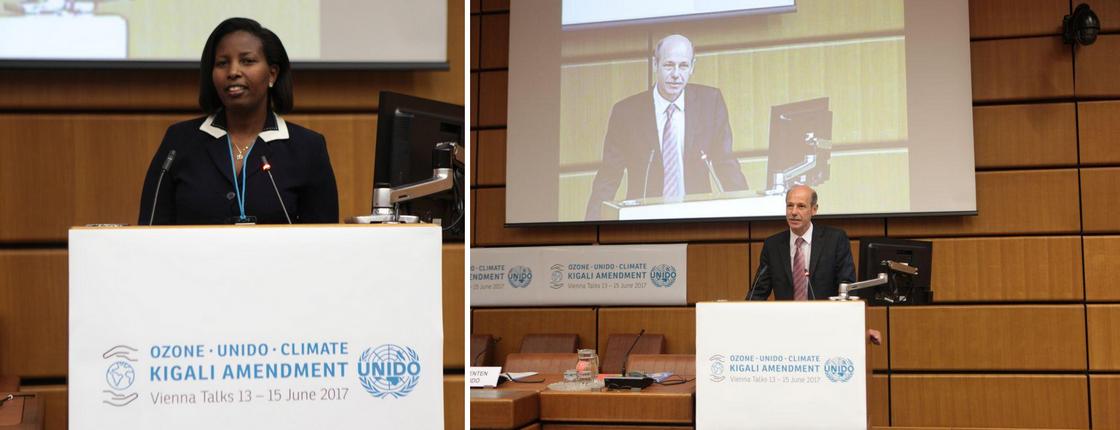Vienna Talks on the Kigali Amendment concluded today

Representatives of 55 countries gathered in Vienna from 13 to 15 June for a special event on the Kigali Amendment to the Montreal Protocol to discuss the opportunities, challenges and key actions for the phase-down of powerful greenhouse gases called hydrofluorocarbons, or HFCs. The ‘Kigali Amendment – Vienna Talks’ was jointly organized by the United Nations Industrial Development Organization (UNIDO) and the governments of Italy and Austria and brought together representatives of developing countries, as well as ozone officers and experts from the academic and private sectors.
“This meeting is an excellent opportunity for National Ozone Officers to share experiences, concerns, ideas and suggestions,” said Juliet Kabera, National Ozone Officer of Rwanda, at the opening of the event. “I encourage all the countries to proceed with the ratification of the Kigali Amendment and I hope that these days in Vienna will help us move forward.”
Adopted in October 2016, the Kigali Amendment aims to phase-down HFCs, which are frequently used as substitutes for the ozone-depleting substances (ODSs) identified in the Montreal Protocol. HFCs however are climate-warming gases that have significant global warming potentials. Countries that ratify the Amendment commit to cutting their production and consumption by more than 80 per cent over the next 30 years. The Amendment will enter into force on 1 January 2019, provided it has at least 20 ratifications. The goal is to achieve over 80 per cent reduction in HFC consumption by 2047. The impact of the Amendment will avoid up to 0.5 °C increase in global temperature by the end of the century.
“Ratification of the Amendment is a crucial commitment towards the future, where protecting the ozone will be united with fighting climate change,” said Philippe Scholtès, Managing Director of the Programme Development and Technical Cooperation at UNIDO. “We can help countries achieve their HFCs phase-down commitments by promoting energy efficiency, and introducing low-carbon and low-emission technologies and practices.”
In addition to the general analysis of the Kigali Amendment, the event covered a wide range of topics such as policy, energy efficiency, technical trainings, certification and the role of women in the refrigeration industry. Through the presentation of projects in some of the participating countries, UNIDO also showcased successful and innovative examples of its activities.
“It is a good opportunity to switch to new technologies that are more environmentally friendly and to improve our economy,” said Noe Megrelishvili, National Ozone Officer from Georgia, as he was talking about the benefits of ratifying the Amendment.

Talking about the challenges of the meeting the requirements of the Kigali Amendment, Margaret Aanyu, National Ozone Officer from Uganda, noted that affordability and availability of alternatives to HFCs is one of the biggest roadblocks to reducing the use of those gases. She added that “once those are there and they are affordable and available, there will be no other choice, because the supply will be reducing.”
The event was also an occasion for UNIDO to showcase how it can assist developing countries and countries with economy in transition to shift from HFCs to ozone- and climate-friendly alternatives and to improve energy efficiency. “This meeting is a perfect example of how UNIDO can support the European countries and Georgia among them,” Megrelishvili said.
“We have a longstanding relation working with UNIDO as an implementing agency,” said Laura Beron, National Ozone Officer from Argentina. “We have always received very good support from them, so I have high expectations because I know that all the things they do always help us go through difficult situations.”
For over 25 years, UNIDO has been supporting countries around the world comply with the phase-out targets of the Montreal Protocol and is ready to take on this next challenge. Thanks to its multifaceted portfolio and technical know-how, UNIDO can further support countries in complying with their additional obligations under the Amendment and in achieving inclusive and sustainable industrial development.
